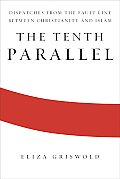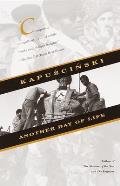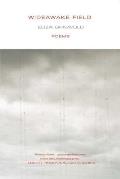
People frequently ask me how it is that a poet becomes a foreign correspondent. The two kinds of writing are really not so different. Both require periods of intense observation, a willingness to risk telling the truth as one sees it, and an effort to use words as precisely as language allows.
Poets report on interior states. Reporters pay attention. At least two of the 20th century's finest foreign correspondents, the English writer, James Fenton, and the late, celebrated Polish journalist, Ryszard Kapuscinski, understood this. In addition to their indelible prose about war, both have written magnificent poetry.
÷ ÷ ÷
For Fenton, in a funny twist on contemporary economies, his early poems funded his reportage. After graduating from Oxford University in the early 1970s, the 20-something Fenton paid for his first journey to East Asia with the proceeds of his award-winning book of poems, Terminal Moraine.
Once there, Fenton wrote an account of the U.S. withdrawal from Vietnam, "The Fall of Saigon," which was published in Granta. It has become one of the finest and most widely anthologized pieces of reportage out of the Vietnam War. (His 1988 nonfiction collection, All the Wrong Places, bears witness to his talent as a prose writer, and to his queasiness at feeling like a war tourist.)
The strength of Fenton's reportage comes out of what he has learned already as a poet. Or rather, the two voices he uses are so interchangeable, it can be difficult to tell where one ends and the next begins. Consider these lines (of prose) about the Philippines from another piece published in Granta, "The Snap Election": "There was a Holy War in Mindanao. There was a communist insurgency. Political dialogue was conducted by murderers. Manila was a brothel."
Here are the first lines from Fenton's poem, "Here Come the Drum Majorettes!"
There's a girl with a fist full of fingers.There's a man with a fist full of fivers.
There's a thrill in a step as it lingers.
There's a chance for a pair of salivas —
The rage, the torqued black humor, the way the simple, declarative sentences pile up — these are disturbing gifts. Fenton's poems also allow him to explore the moral dilemmas he has experienced as a journalist. Or maybe he's drawn to moral dilemmas, and his work as a reporter allows him to explore complex landscapes of human suffering. His 1982 collection of poems, Memory of War, framed the most unforgettable images of conflict and injustice in his time based on his reporter's observations in Vietnam and Cambodia.
No poem more so than "Dead Soldiers," which begins:
When His Excellency Prince Norodom ChantaraingseyInvited me to lunch on the battlefield
I was glad of my white suit for the first time that day.
They lived well, the mad Norodoms, they had style.
The brandy and soda arrived in crates.
Bricks of ice, tied around with raffia,
Dripped from the orderlies' handlebars.
Remove the line breaks, and the poem's first stanza could serve as great, clear-eyed prose. But it's not prose. It's poetry. Why? This isn't a matter of line breaks. It's the quality of his attention, the doubleness of his allegory that transforms this work. Fenton's poems are made of observations compressed until they glitter at every edge.
÷ ÷ ÷
Ryszard Kapuscinski, the peripatetic journalist who died in 2007, wrote both prose and poems in his mother tongue of Polish. Chronicling daily news from Africa's forgotten Cold War battlefields, he stitched together masterful dispatches. Few people knew that, at the same time, Kapuscinski was also composing poetry.
Take, for instance, his sojourn in Angola as civil war began in the mid-'70s. While Fenton was watching the fall-out of America's failed effort to contain communism in East Asia, Kapuscinki was riding along with the enemy in the African country of Angola.
 Bumping along the capital of Luanda's lethal land-mined roads, the salty Pole gathered the material to write, at great personal risk, the war's most evocative nonfiction account, Another Day of Life. He transcends the particulars of any one, backwater frontline. And he exposes the universal act of groveling that journalists make in all badly organized wars, when he writes:
Bumping along the capital of Luanda's lethal land-mined roads, the salty Pole gathered the material to write, at great personal risk, the war's most evocative nonfiction account, Another Day of Life. He transcends the particulars of any one, backwater frontline. And he exposes the universal act of groveling that journalists make in all badly organized wars, when he writes:
"But let's not give up hope or become dispirited! Let's reach into the arsenal of persuasion. A thousand arguments speak in our favor. We have our documents in order. There is the text, the stamp, and the signature. We know President Agostinho Neto personally. We know the front commander. We are writing dispatches, we are making Angola and its champions of right famous around the world."
While he was writing dispatches, however, our correspondent was also writing poems. Few people know this, but a careful reader of Kapucinski's prose will note the preoccupation with line breaks he has when transcribing telex messages he sent home from Africa to Poland.
As he was blustering at checkpoints in Angola, he was quietly watching the mysteriousness of death creep around him. Here is one of his untitled poems from the war in Angola. (One collection of his poems, I Wrote Stone, has been translated into English.)
On a plane to Luanda a young soldier
lies on a stretcher
that morning a bullet shattered his skull
an IV hangs from a hook
the man tosses
he's delirious
perhaps he's relating what happened
we never found out
where he flew to
in the end
 The poem is powerful for its mysteries, for the speaker's admission of how little he actually knows of what the man was dreaming about and where he was going. Recently, the veracity of some of Kapucinski's work has been called into question. There are issues of whether or not he embellished his African encounters. Or whether he made up entire experiences.
The poem is powerful for its mysteries, for the speaker's admission of how little he actually knows of what the man was dreaming about and where he was going. Recently, the veracity of some of Kapucinski's work has been called into question. There are issues of whether or not he embellished his African encounters. Or whether he made up entire experiences.
These gripes do not apply to his poems. Because it doesn't matter whether or not Kapuscinski, the poet, interviewed this soldier in Angola. Or only watched from the tarmac as the wounded man's stretcher was loaded onto the plane. The poet is communicating another kind of truth — one that must be left unknown. Like Fenton, Kapucinksi stands inside the world of his poems. He is a character, bumbling and confused, as any other person in a war zone would be.
In this brief essay, I set out to show how, for these two recent masters, one kind of writing informs the other. The two are intertwined. I end with "Foreign Correspondence," a poem from my first book, Wideawake Field, which I wrote while reporting my recent non-fiction book, The Tenth Parallel: Dispatches from the Fault Line Between Christianity and Islam.
Foreign Correspondence A child coughs from beneath a roof
of pirated tin. The radio chuckles
in French from the coast
where the room is cool
and someone is wearing a tie.
The walls are thinner here.
I wake to the sound of a man
beating his wife.